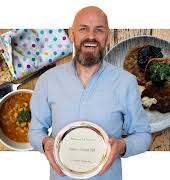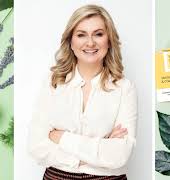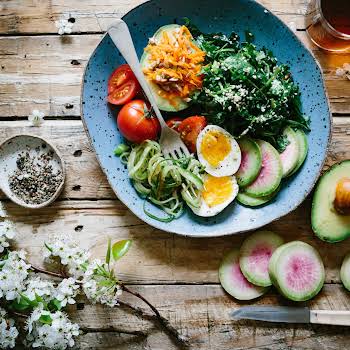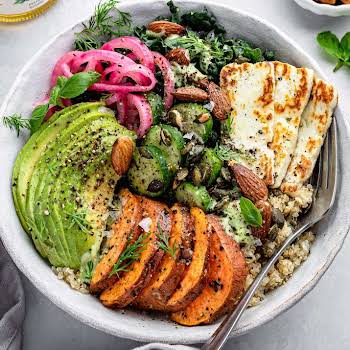
Step off the hamster wheel of dieting: an in-depth guide to intuitive eating
Are you sick and tired of the idea of “good” and “bad” food? Tune in to the Intuitive Eating movement, which offers a kinder alternative to binary thinking.
How many of the following diets have you tried: Keto? Paleo? Intermittent fasting? Cabbage soup? Weight Watchers?
If you are anything like “average”, research conducted in January 2020 reveals that the average woman will try 126 diets in a lifetime. That’s a lot of time counting calories, stepping on and off scales, fretting over social events (remember them?), “last hurrahs” and hating on your body.
What if, this year, you didn’t resolve to lose weight, but instead devote 2023 to changing your relationship with food and your body, rather than punishing it? It’s possible, it just involves having a chat with yourself.
Advertisement
Intuitive Eating, the anti-diet movement founded by Elyse Resch and Evelyn Tribole in 1995, isn’t a new concept, but in 2020 it blew up. Maybe the latest edition of their original book, Intuitive Eating: A Revolutionary Anti-Diet Approach, landed at a good time; maybe it hit the sweet spot with a huge cohort of women exhausted with diet culture and head chatter, by the never-ending loop of diet-maintain-regain-diet. Whatever, it seems we’re ready for a new horizon.
What is Intuitive Eating?
Intuitive Eating is an anti-diet mind/body approach to living, comprised of ten key principles (see opposite*). The programme’s aim is to help the individual repair and heal their disordered relationship with food and the often deeply ingrained mixed messaging from the diet industry. Designed to bring freedom to body and mind, it is a weight-inclusive movement that focuses on the fact that we know what’s right for our body’s needs, and helps the individual tune out habitual negativity.
Sinéad and Gillian Crowe are sisters who both work in wellness and mental health sectors. In March 2020, just as Covid struck, they started growing a community around Intuitive Eating, which they’d been practising, and enjoying, for over a year. They opened an Instagram account (@intuitive.eating.ireland) that quickly gathered more than 5,000 followers, and thousands more are engaging with their daily posts and videos.
“Eating intuitively takes patience, commitment and trust as we begin to adjust to new food habituation,” says Sinéad. “Equally, you have to release judgement and labels that are unhelpful – like ‘good’ and ‘bad’ food – food is just food, and our bodies know what they need to survive; we just need to learn to listen, and learn what feels good… what energises us, and what makes us feel happy, not lethargic and groggy.”
Diet-binge dycotomy
But if we stopping dieting, will we all not instantly binge? “Initially, that may happen,” says Sinéad. “After a long period of dieting, the body doesn’t know that there isn’t another diet coming on Monday. But that’s a necessary part of the process. Bodies need to learn they can have what they want. For example, I remember when I was restricting food, I’d save up my chocolate for Fridays – I’d nearly be giddy at the thought of it. Now I can have chocolate whenever I want, I’m no longer excited. I can start asking myself, ‘Do I really want it right now, or perhaps have it another time?’”
Thirty-five-year-old mother of two Nicola Carolan (@thenakedblondie) is a recent convert to Intuitive Eating. After a lifetime of dieting – she was aged five when put on her first “diet” – Nicola lost 11 stone in recent years, only to find herself feeling more miserable than ever when at her lowest weight. She felt she was always chasing some holy grail and always wanted to be smaller. Nicola remembers, “I was in a very dark place, my anxiety was through the roof, and I honestly think I was on the brink of an eating disorder.
Advertisement
“I got to a point last year where I thought, ‘Is this it? Am I going to spend the rest of my life on a diet? To miss out on occasions and constantly restrict myself, or to restrict and then blow out, binge, and then feel shame?’ And I said, ‘No, there has to be another way’, and that’s when I stumbled across Intuitive Eating.
“It was very hard to awaken myself to these new thoughts and ways. Surely, if I wasn’t on a diet, I was just eating all the food. But that wasn’t the case, because if you educate yourself on the principles of Intuitive Eating, you’ll see that.”
I realised that it’s okay to enjoy more food than the body needs, but it’s also okay to say no to a plate or piece of food that I didn’t want at that time.
Knowing that I’m not going into another restriction and denial took so much pressure away from my thoughts and behaviour around eating.
“Instead, I released all feelings around eating, about my preoccupation with my appearance, and about what others might think of me. And by letting go, I enjoy things a whole lot more. Better than everything, the process has made me more compassionate to myself, my husband, my kids and my family.” And for Nicola? “The most important thing about this movement for me is not just ditching the whole diet mentality, but the focus on health – both body and mind. I’ve honestly never felt better.”
Advertisement
The ten principles of Intuitive Eating
According to Elyse Resch and Evelyn Tribole…
1 Reject the diet mentality
Throw out the diet books and magazine articles that offer you the false hope of losing weight quickly, easily, and permanently. Get angry at diet culture that promotes weight loss and led you to feel as if you were a failure every time a new diet stopped working and you gained back all of the weight.
2 Honour your hunger
Keep your body fed with adequate energy and carbohydrates. Otherwise, you can trigger a primal drive to overeat. Once you reach the moment of excessive hunger, all intentions of moderate, conscious eating are fleeting and irrelevant. Learning to honour this first biological signal sets the stage for rebuilding trust in yourself and in food.
3 Make peace with food
Call a truce; stop the food fight! Give yourself unconditional permission to eat. If you tell yourself that you can’t or shouldn’t have a particular food, it can lead to intense feelings of deprivation, cravings and, often, binging. And then guilt.
4 Challenge the food police
Scream a loud no to thoughts in your head that declare you’re “good” for eating minimal calories or “bad” because you ate a piece of chocolate cake. The police station is housed deep in your psyche, and its loudspeaker shouts negative barbs, hopeless phrases, and guilt-provoking indictments. Chase the food police away.
5 Discover the satisfaction factor
In our compulsion to comply with diet culture, we often overlook one of the most basic gifts of existence – the pleasure and satisfaction that can be found in the eating experience. You will find that it takes just the right amount of food for you to decide you’ve had “enough”.
6 Feel your fullness
Listen for the body signals that tell you that you are no longer hungry. Observe the signs that show that you’re comfortably full. Pause in the middle of eating; ask yourself how the food tastes, and what your current hunger level is.
Advertisement
7 Cope with your emotions with kindness
First, recognise that food restriction, both physically and mentally, can, in and of itself, trigger loss of control, which can feel like emotional eating. Find kind ways to comfort, nurture, distract, and resolve your issues. Food won’t fix feelings. It may comfort for the short term, distract from the pain, or even numb you. But food won’t solve the problem. You’ll ultimately have to deal with the source of the emotion.
8 Respect your body
Accept your genetic blueprint. Respect your body so you can feel better about who you are. All bodies deserve dignity.
9 Movement – feel the difference
Forget militant exercise. Shift your focus to how it feels to move your body, rather than the calorie-burning effect of exercise.
10 Honour your health – gentle nutrition
Make food choices that honour your health and taste buds while making you feel good. Remember that you don’t have to eat perfectly to be healthy; it’s what you eat consistently over time that matters. Progress, not perfection, is what counts.
Featured image by Getty.
This article was originally published in January 2022.
Advertisement























